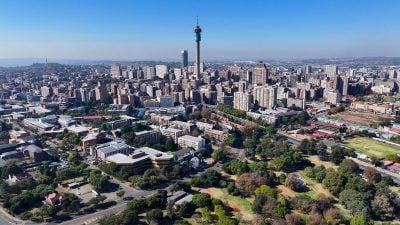Last month, the ANC celerated its 100th anniversary. The question now, says Tom Nevin, is whether the party can transform its revolutionary triumph into an economic success for the masses.
The African National Congress’s 100th anniversary inevitably invited the question about whether the party is as good a government as it was a revolutionary.
The organisation, born of an inhuman social, political and economic system, battled and ultimately defeated the monster of apartheid at great cost and sacrifice. Now it faces a struggle as desperate, but seems unable to muster the will and the energy to confront the monster of economic inequality as selflessly.
It is making heavy weather of getting the politics and social issues to work now that the revolution has been won; economic development is grindingly slow.
The ANC’s record shows that it took on the struggle 100 years ago to right a monumental wrong, but having achieved that goal, its wheels are spinning as it seeks social and development traction in a patch of muddy politics. The growing number of critics pointing this out aren’t telling the ANC anything it doesn’t already know, and it made that point forcefully in its traditional 8th January National Executive Committee statement, an annual event that spells out the party programme and instructions to its cadres for the year ahead.
It devoted this year’s message almost entirely to spelling out in precise detail how it intends to mend its ways.
The problem facing the ruling party is that it seems unsure of how to make the transition. It was born into a struggle that pitted black against white and its purpose was simple – to be rid of colour as the basis of government, privilege and opportunity.
Along the way it flirted with an array of economic, social and political models tilting from communism to capitalism, socialism and nationalism and all the permutations in between.
In the dark years that fed the revolutionary fervour, its leaders would have given scant thought to, or imagined, the problems an ANC-led government would face 100 years hence as it tried to give political substance to the ideals it fought for.
The jury is still out over whether or not the ANC today is a fully-fledged political party complete with the trappings of ruling with finesse and elegance; but if it is not then that is what it aims for. In its 8th January tone-setter for the political calendar, it recognised the three major challenges facing South Africa: high unemployment, deepening poverty and growing economic inequality. It candidly accepted its shortcomings and announced that “the government plans … a rejuvenated organisation with new organisational and strategic capabilities”. In short, watch this space: you’re about to see a leaner, hungrier, more streamlined, younger, more professional, more thoughtful and forward-thinking ANC than ever.
A century is too far into the future to contemplate; a decade is more digestible, although the governance makeover that has been placed before South Africans by the current administration is rightly defined as “too much icing, not enough cake”.
Is there really a reason to party?
The more cynical will observe that only a small proportion of South Africans have cause to celebrate the ANC’s centenary. The jobless rate is soaring, social delivery is at a historic low, corruption and graft are a creeping cancer in both public and private sectors, division wracks the ANC, the ruling tripartite alliance is dangerously shaky.
Should the party be celebrating its 100th birthday at all, or should the event have been allowed to slip by unnoticed as office bearers busy themselves instead with righting the ship and make it seaworthy for all?
“Perish that thought!” retorts Gwede Mantashe, secretary-general of the ANC. “It would have been a grievous fault for our movement and the people of South Africa not to celebrate the heritage and legacy of our struggle. It would also have been a tragedy if the ANC did not recall and celebrate the triumph of our people over colonialism, imperialism and racial oppression. It would have been a historical error not to recognise the African institution that the ANC has become.”
While individuals in power are fleeting, “the ANC is forever”, says Cynthia Pieterson, a young black law school graduate doing her articles at a Pretoria attorney partnership. “We have a long way to go and we’ll make many more mistakes,” she says. “But experience is the best teacher and we’re fast learners.”
In addition, rejoins Keith Khoza, the ANC’s communications manager, it wasn’t as if the new government walked in and took over a well-functioning democracy. “We started with having to address lack of access to water, absence of primary health care, lack of housing and lack of basic infrastructure in the black townships and rural areas. Government expenditure used to be structured to favour minorities, white people in particular. There was no safety network for the poor and job reservation excluded black people from meaningful jobs and management. The economy stagnated with no hope of growth. The ANC came to power in 1994 on a pro-poor platform that prioritised basic human necessities.”
Regrets and unintended consequences
Three black presidents have overseen the task of making South Africa an egalitarian home for all its people – Nelson Mandela in the first five-year term after democracy, Thabo Mbeki and now Jacob Zuma. Each has contributed to the transformation in his own way and each can look back on his record with satisfaction. There are also regrets for things left undone or not completed.
Today, the ANC worries that ever since it assumed power 17 years ago, South Africa had tilted towards a welfare state as the new government sought ways to financially uplift millions of chronically poor.
It poured billions of rands into grants and subsidies to give the desperately poor a half-decent life. “But we never intended to be a welfare state,” says Minister in the Presidency, Aziz Pahad. “Our intention always was to be a developmental state.”
But a model cannot perform if 40% of the workforce is idle and most of wealth is in the hands of a small minority.
“The ANC is increasingly unable to advance its struggle credentials as an excuse for its failings as a successful post-Apartheid government,” maintains Emma Powell, Cape Town-based Africa politics academic.
After consultation with industry specialists and the public sector, the National Planning Commission has identified nine major challenges facing South Africa: widespread unemployment, ailing infrastructure, low standards of education, exclusion of the poor from mainstream development, a resource-dependent economy, a failing public health system, inept public service provision, widespread corruption and societal division.
“We support the proposal, so over the coming year, we will hold the government accountable in terms of its policy implementation,” says Lindiwe Mazibuko, the Democratic Alliance official opposition parliamentary leader. While political and social justice were the goals that sparked and drove the ANC revolution, the party must now rethink the way forward to bring about the economic justice 50m South Africans are clamouring for.
Want to continue reading? Subscribe today.
You've read all your free articles for this month! Subscribe now to enjoy full access to our content.
Digital Monthly
£8.00 / month
Receive full unlimited access to our articles, opinions, podcasts and more.
Digital Yearly
£70.00 / year
Our best value offer - save £26 and gain access to all of our digital content for an entire year!
 Sign in with Google
Sign in with Google 


